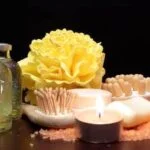Aromatherapy oil properties play a crucial role in the practice of aromatherapy, a holistic healing treatment that utilizes natural plant extracts to promote physical, mental, and emotional well-being. In this introductory section, we will explore the fundamentals of aromatherapy oils, including their origins, cultural significance, and how they work to support overall health.
Aromatherapy has been used for centuries as a means of enhancing health and wellness through the use of aromatic plant extracts. The history of aromatherapy is rich and diverse, with origins spanning various ancient cultures around the world. Understanding the historical context of aromatherapy provides valuable insight into the traditional uses and beliefs surrounding these potent oils.
This comprehensive guide will delve into the intricate properties of essential oils and carrier oils, shedding light on their unique attributes and therapeutic benefits. Moreover, we will identify the top 10 aromatherapy oils renowned for their healing properties and discuss how these oils can be utilized for stress relief, mental clarity, and overall holistic health.
Whether you’re new to aromatherapy or a seasoned enthusiast, this guide will offer valuable information on harnessing the power of aromatherapy oil properties for your well-being.
The History of Aromatherapy
Aromatherapy has a rich history that dates back thousands of years, with evidence of its use found in ancient civilizations such as Egypt, China, and India. The practice of using aromatic plant extracts for medicinal and therapeutic purposes can be traced as far back as 3,000 BC. In fact, the Egyptians were known to have used essential oils in their religious rituals, as well as for embalming the dead and treating various ailments.
In China, aromatherapy was an integral part of traditional Chinese medicine, where it was used to promote balance and harmony within the body. Similarly, in India, the use of aromatic oils was deeply rooted in Ayurveda, the traditional system of medicine that emphasizes the holistic approach to health and wellness.
Throughout history, different cultures have recognized the powerful healing properties of aromatherapy oils. From promoting relaxation and reducing stress to treating physical ailments and improving overall well-being, these aromatic oils have played a significant role in shaping the cultural practices of many societies.
Undoubtedly, the historical significance of aromatherapy oils highlights their enduring appeal and relevance across diverse cultures. As we continue to explore and understand the properties of these oils, we gain a deeper appreciation for their role in promoting holistic health and well-being.
| Historical Significance | Cultural Practices |
|---|---|
| The practice dates back thousands of years | Used in ancient Egyptian religious rituals and Chinese traditional medicine |
| Recognized for their healing properties | Aromatic oils have shaped cultural practices around the world |
Understanding Aromatherapy Oil Properties
Aromatherapy oil properties are the unique chemical components that give each essential oil its characteristic scent and therapeutic benefits. These properties are what make aromatherapy oils such a powerful tool for holistic health and well-being. Understanding these properties is essential for anyone looking to harness the full potential of aromatherapy.
Some of the most common aromatherapy oil properties include antibacterial, antiviral, anti-inflammatory, antioxidant, and sedative. Each essential oil has its own unique combination of these properties, which determines its specific effects on the body and mind.
To get a better understanding of aromatherapy oil properties, it can be helpful to categorize them based on their therapeutic effects. For example:
- Antimicrobial properties: Essential oils like tea tree, lavender, and eucalyptus have strong antimicrobial properties that make them effective for treating infections and boosting the immune system.
- Relaxing properties: Oils such as chamomile, ylang-ylang, and bergamot possess sedative properties that can help promote relaxation, reduce stress, and improve sleep quality.
- Stimulating properties: Citrus oils like lemon and grapefruit have stimulating properties that can increase energy levels, improve mood, and enhance mental clarity.
By understanding these aromatherapy oil properties, individuals can make informed choices about which oils to use for specific health concerns or wellness goals. Whether used in massage therapy, diffusers, or topical applications, harnessing the power of aromatherapy oil properties can have a profound impact on one’s overall well-being.
Essential Oils vs Carrier Oils
When it comes to aromatherapy, it’s important to understand the difference between essential oils and carrier oils. Essential oils are highly concentrated plant extracts that have been used for centuries for their therapeutic properties. These oils are extracted from different parts of aromatic plants such as flowers, leaves, or roots, and each one has its own unique set of aromatherapy oil properties.
On the other hand, carrier oils are more commonly used to dilute essential oils before they are applied to the skin. They are much milder and have their own beneficial properties.
Essential oils are known for their strong aroma and potent healing properties. They are typically used in small amounts due to their concentration and should not be directly applied to the skin without proper dilution with a carrier oil. Some popular essential oils and their respective aromatherapy oil properties include lavender (calming and sedative), peppermint (refreshing and energizing), and tea tree (antibacterial and antifungal).
Carrier oils, also known as base oils or vegetable oils, are used to dilute essential oils without altering their therapeutic properties. These oils have moisturizing and nourishing effects on the skin when applied topically, making them an ideal medium for massage and skincare treatments. Some common carrier oils include jojoba oil (known for its long shelf life), coconut oil (hydrating and soothing), and sweet almond oil (absorbs easily into the skin).
It’s important to note that both essential oils and carrier oils play a crucial role in aromatherapy practices, each contributing their unique benefits to promote overall health and well-being. Understanding the difference between these two types of oils is essential for safe and effective use in aromatherapy treatments.
The Top 10 Aromatherapy Oils and Their Healing Benefits
Aromatherapy oils have been used for centuries for their healing and therapeutic properties. These essential oils are derived from various plants, flowers, and herbs, and each oil possesses its own unique set of properties that contribute to its healing benefits. Here are the top 10 aromatherapy oils and their specific healing properties:
1. Lavender Oil: Known for its calming and soothing properties, lavender oil is often used to promote relaxation, reduce stress, and improve sleep quality.
2. Peppermint Oil: With its invigorating and cooling effect, peppermint oil can help alleviate headaches, nausea, and improve mental focus.
3. Tea Tree Oil: A potent antiseptic and anti-inflammatory oil, tea tree oil is commonly used to treat skin conditions such as acne, eczema, and fungal infections.
4. Eucalyptus Oil: This refreshing oil is commonly used to relieve respiratory issues such as congestion, coughs, and sinusitis.
5. Chamomile Oil: Known for its calming effects on both the mind and body, chamomile oil can help reduce anxiety, promote relaxation, and soothe digestive discomfort.
6. Rosemary Oil: With its stimulating properties, rosemary oil can help improve memory retention, boost mental clarity, and relieve muscle pain.
7. Lemon Oil: A bright and uplifting oil, lemon oil is effective in promoting a positive mood, boosting energy levels, and supporting immune function.
8. Ylang Ylang Oil: This exotic floral oil is prized for its ability to reduce stress and anxiety while also acting as an aphrodisiac.
9. Bergamot Oil: Known for its citrusy scent and mood-lifting properties, bergamot oil can help reduce feelings of anxiety and depression.
10. Frankincense Oil: Renowned for its grounding and spiritually uplifting qualities, frankincense oil is often used in meditation practices to promote a sense of peace and tranquility.
Understanding the specific healing benefits of each aromatherapy oil allows individuals to harness their therapeutic properties effectively for holistic health improvement. Whether diffused aromatically or applied topically with proper dilution methods, these essential oils offer a natural approach to enhancing physical well-being while supporting emotional balance through their aromatic properties.
When using aromatherapy oils as part of a holistic health regimen, it’s important to be knowledgeable about their various properties in order to maximize their healing benefits safely and effectively.
How to Use Aromatherapy Oils for Stress Relief and Mental Clarity
Aromatherapy oils have been used for centuries to promote relaxation, reduce stress, and improve mental clarity. The use of these oils can be a powerful tool in managing the demands of daily life and supporting overall well-being. Understanding how to use aromatherapy oils for stress relief and mental clarity can provide great benefits for both the mind and body.
Methods of Application
There are several methods for using aromatherapy oils to promote stress relief and mental clarity. One popular method is inhalation, which can be done by adding a few drops of essential oil to a diffuser or inhaling directly from the bottle.
Another option is topical application, where diluted essential oils are applied to the skin through massage or added to bath water. Additionally, some individuals may choose to use aromatherapy oils internally, although this should only be done under the guidance of a qualified aromatherapist.
Recommended Oils for Stress Relief and Mental Clarity
When it comes to choosing the right aromatherapy oils for stress relief and mental clarity, there are several options to consider. Lavender oil is known for its calming properties and can help reduce stress and promote relaxation. Peppermint oil is also popular for its invigorating effects on the mind, making it a great choice for improving mental clarity.
Tips for Effective Use
To make the most of aromatherapy oils for stress relief and mental clarity, it’s important to use them safely and effectively. Always dilute essential oils with a carrier oil before applying them to the skin, as undiluted essential oils can cause irritation.
It’s also important to do a patch test before using any new oil to check for potential allergic reactions. Finally, choosing high-quality, pure essential oils will ensure that you’re getting the full benefit of their aromatherapy oil properties.
Aromatherapy Oil Safety
Aromatherapy oils have been used for centuries to promote physical and emotional well-being. However, it’s important to use these potent oils safely and responsibly. Proper dilution and application are crucial to ensuring that you experience the therapeutic benefits of aromatherapy without any adverse reactions. In this section, we will explore some tips for safely using aromatherapy oils.
Understanding Dilution Ratios
One of the most important aspects of using aromatherapy oils safely is understanding how to dilute them properly. Essential oils are highly concentrated and should never be applied directly to the skin without being diluted first. The general rule of thumb is to use a 2% dilution ratio, which equates to about 12 drops of essential oil per ounce of carrier oil for adults.
For children, the ratio should be even lower, at around 1%. It’s also important to note that some essential oils require even further dilution due to their strong properties.
Safe Application Methods
When it comes to applying aromatherapy oils, there are several safe methods to consider. The most common way is through topical application, where the diluted oil is massaged into the skin. Another popular method is inhalation, whether through a diffuser or simply inhaling the scent directly from the bottle.
Additionally, some people choose to add a few drops of essential oil to their bath for a relaxing and aromatic experience. It’s important to remember that not all essential oils are suitable for all application methods, so it’s crucial to do your research before using them.
Precautions and Sensitivities
While aromatherapy oils can offer numerous benefits, it’s also important to be aware of potential sensitivities and precautions. Some individuals may have allergies or sensitivities to certain essential oils, so it’s recommended to perform a patch test before using a new oil topically.
Pregnant women and those with medical conditions should also exercise caution when using aromatherapy oils. Additionally, certain essential oils can make the skin more sensitive to sunlight, so it’s important to avoid sun exposure after applying these particular oils topically.
By following these tips for proper dilution and application, you can enjoy the many benefits of aromatherapy while ensuring your safety and well-being. Remember that each person may react differently to different essential oils, so it’s always best practice to consult with a qualified aromatherapist or healthcare professional before incorporating aromatherapy into your self-care routine.
The Future of Aromatherapy
In recent years, the use of aromatherapy oils has gained popularity not only for their pleasant scents but also for their potential therapeutic benefits. As ongoing research continues to explore the potential uses and benefits of essential oils, there are several emerging trends and innovations in the field of aromatherapy that are worth noting.
One notable trend is the integration of aromatherapy into mainstream healthcare practices. With a growing body of scientific evidence supporting the use of essential oils for various health conditions, more healthcare providers are incorporating aromatherapy into their treatment plans. This includes using essential oils in conjunction with traditional medical interventions to enhance patient outcomes.
Another emerging trend in aromatherapy is the development of personalized oil blends tailored to individual needs. By considering factors such as a person’s unique health concerns, preferences, and goals, aromatherapists and healthcare practitioners are increasingly customizing essential oil blends for their clients. This personalized approach allows for a more targeted and effective use of aromatherapy oils to address specific health issues or promote overall well-being.
Furthermore, there is a growing interest in sustainable and ethical sourcing practices within the aromatherapy industry. Consumers are becoming more conscious about where their essential oils come from and how they are produced. As a result, there is an increasing demand for responsibly sourced and eco-friendly essential oils.
This shift towards sustainability aligns with the larger movement towards holistic health practices that prioritize both personal wellness and environmental stewardship. These emerging trends reflect the evolving landscape of aromatherapy and indicate a promising future for the continued exploration and utilization of aromatherapy oil properties in promoting holistic health and well-being.
Aromatherapy Oil Properties and Their Role in Holistic Health and Well-Being
In conclusion, aromatherapy oils have been used for centuries as a natural remedy for physical, emotional, and mental ailments. The properties of these oils play a vital role in promoting holistic health and well-being. Whether it’s the calming effects of lavender oil or the uplifting benefits of citrus oils, each essential oil offers unique properties that can contribute to a person’s overall wellness.
The extensive history of aromatherapy and the cultural significance of these oils have paved the way for their widespread use in modern holistic practices. As we continue to uncover the healing benefits of aromatherapy oil properties, it is essential to recognize the potential they hold in contributing to a balanced and healthy lifestyle.
Looking ahead, the future of aromatherapy holds promising innovations and emerging trends that will further expand our understanding of aromatherapy oil properties and their potential impact on holistic health. With ongoing research and development, we can expect to see new applications and uses for these oils that will continue to benefit individuals seeking natural remedies for their well-being.
By harnessing the power of aromatherapy oil properties, we can embrace a more holistic approach to health and wellness, aligning our physical, emotional, and mental aspects for overall balance and harmony.
Frequently Asked Questions
What Is Aromatherapy Oil Good For?
Aromatherapy oil is known for its ability to promote relaxation, reduce stress and anxiety, improve sleep quality, and relieve headaches and migraines. Different types of aromatherapy oil can have varying effects, but overall it is often used for its calming and soothing properties.
What Are the Properties of Essential Oils?
Essential oils have a wide range of properties, including being anti-inflammatory, antiviral, antibacterial, and antifungal. They are also known for their ability to improve mood, boost immune function, and relieve pain. Each essential oil has its unique set of properties that can be beneficial for different purposes.
What Are the Characteristics of Aromatherapy?
Aromatherapy is characterized by the use of natural plant extracts (essential oils) to promote physical and psychological well-being. It involves inhaling the aroma of these oils or absorbing them through the skin via massage or other applications. Aromatherapy is often used in conjunction with traditional medicine as a complementary therapy for various conditions.

Are you looking for a natural way to improve your health and wellbeing?
If so, aromatherapy may be the answer for you.





